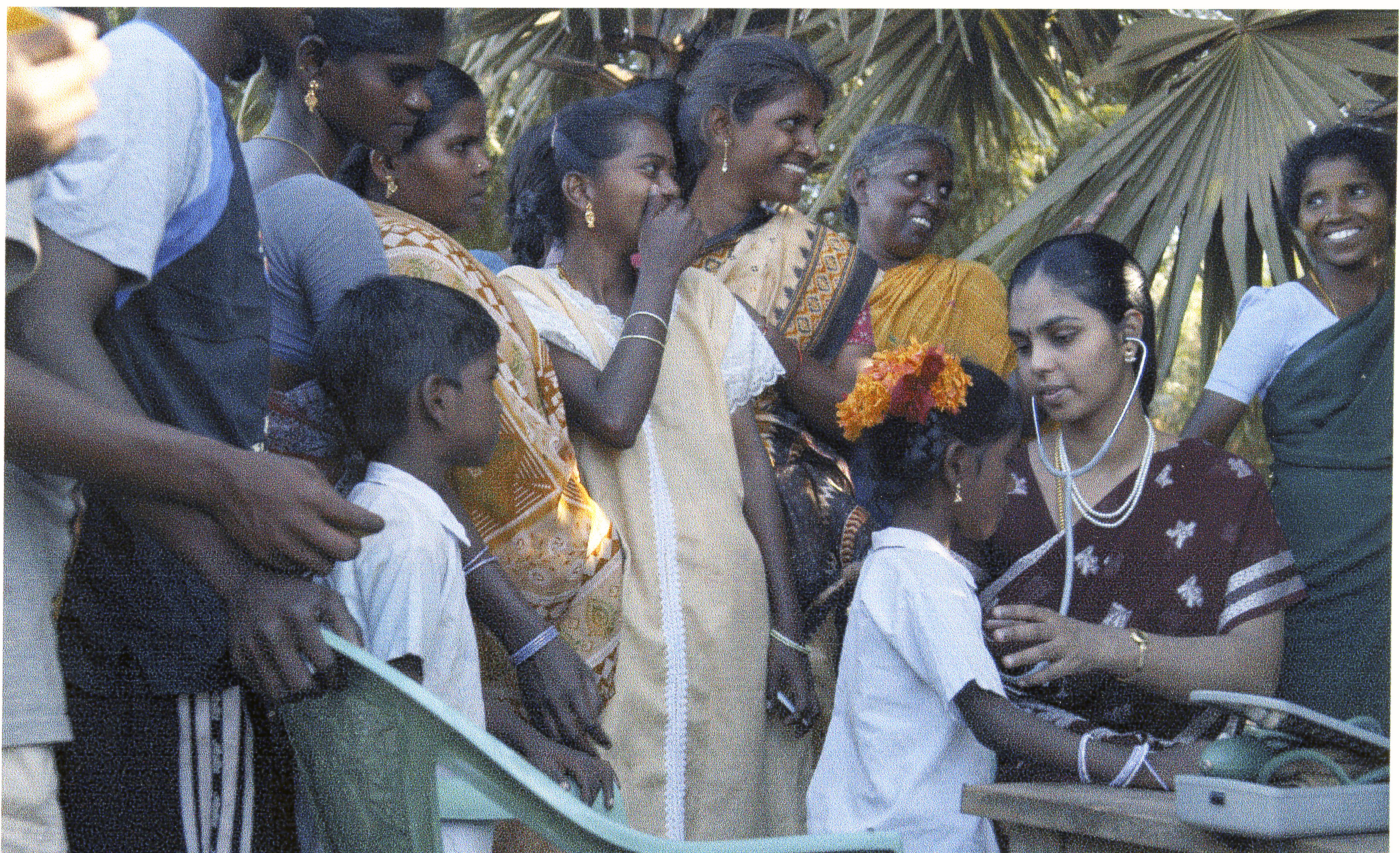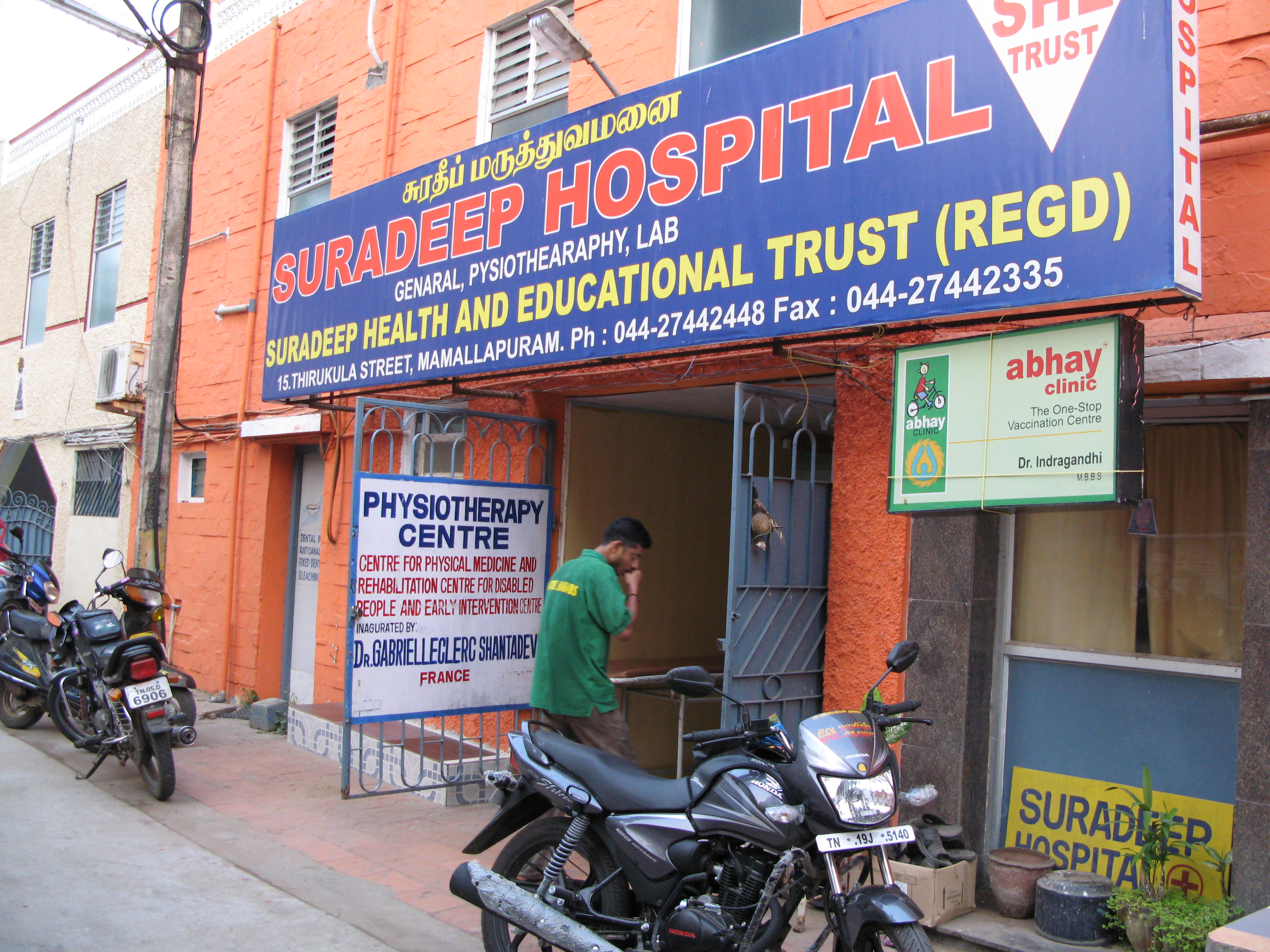‘Medicine in India is definitely affordable’

For a small-town doctor on India’s southeast coast, treating patients is not about the money, but about job satisfaction. And while Indira Gandhi looks after plenty of needy people, she believes that medicine is affordable in India.
The patient flow at Suradeep Hospital in Mamallapuram is dictated partly by the bus schedule – in on the hour, out on the half hour – with pressure on the staff not to keep the bus waiting for too long.
I hesitate in the busy waiting room until a white-haired man suggests I ask the receptionist for a token. I’m expecting a coin-like object, but instead I get a tiny piece of cardboard snipped from a pack of pills. It has the number “11” scrawled on it.
Once the sari-clad doctor learns that I’m a healthy journalist, she asks if I can come back later that night. By then there are fewer people but more mosquitoes in the simple waiting room with its metal chairs and humming ceiling fans. Posters on the walls offer information about rabies, swine flu and hair loss.
Gandhi has been running the 20-bed hospital for 20 years. When she tells me her name, she can see that I’m surprised.
“I was born on the day she was elected prime minister. My father was a politician and he named me after her, feeling that I should become a doctor or a politician and be of service to the community,” laughs Gandhi.
The sense of service seems to have made an imprint on her; she hasn’t had a vacation in all those years – perhaps just 30 days off. Normally she is the only doctor on duty; the other staff members are nurses.
The two-storey hospital admits patients from 8am until midnight. Gandhi lives right next door, making it easy for her to go home for meals.

More
Examining healthcare in India
Private versus public
Suradeep is a private hospital: probably more expensive than a government-run one, but not as costly as some city-based ones.
“People choose a hospital according to their socio-economic status and according to the hospital’s services,” Gandhi says. “My hospital isn’t like others – such as the private ones in Chennai, where you have to pay a consulting fee just to register your name. That costs anywhere from 50-500 rupees (CHF1-10).”
According to Gandhi, “in government hospitals everything – including operations – is essentially free, but there are charges for some things like CT scans and other diagnostics”.
Suradeep Hospital specialises in primary care as well as some laboratory diagnostics and physiotherapy. Most of Gandhi’s patients are fishermen and shopkeepers. She also treats about 500 tourists per year, mainly for digestive and skin problems.
“People can come and talk to me and I charge according to what they can afford. So for the gypsies, I give a free consultation and they only have to pay for the medicine. Or sometimes I can give them the free samples that I get from the pharmaceutical companies,” Gandhi explains.
In the waiting room, I notice how patients receive small doses of medication – maybe just half of a blister pack rather than the whole box. This is quite a contrast to the waste of the west, where patients often end up with a surplus that gets thrown away.
“We try to dispense only the brand-name drugs. They are very expensive compared to the generic versions,” Gandhi says. “We want to give them the best quality. In any event, they should have the whole course of treatment, especially in the case of antibiotics. You can’t skip a day.”
The per capita income in India is about 50,000 rupees (CHF875), but more than 40% of its 1.2 billion people live on less than CHF1.18 per day.
Basic painkillers cost anywhere from CHF0.04-0.43 for a pack of 10, but more sophisticated drugs can easily cost CHF4 for a package of the same size.
Most Indians pay for medication out of pocket. Others have private health insurance that covers the cost of prescription drugs. In some Indian states, needy patients qualify for publicly-funded healthcare – including medicine.
Too expensive?
Even if it’s too pricey for some, Gandhi doesn’t think prescription drugs are overpriced in general.
“Compared with other countries, the cost of medicine in India is definitely affordable. A lot of tourists stock up if they can, especially on herbal and Ayurvedic medicines. And for locals, the government policy helps foot the bill. The prices are reasonable in India,” she says.
In some Indian states, such as Tamil Nadu, needy patients with diabetes, heart disease and other chronic illnesses qualify for free medication. Part of Gandhi’s job is clarifying whether people will need financial aid.
“I counsel my patients, explaining that they might have to pay 300 rupees a month for the rest of their lives. If this is going to be a financial burden, I refer them to a government primary health centre,” Gandhi says.
“But I don’t know how other doctors deal with this. Maybe some simply say that they have to buy it.”
For Gandhi, making money isn’t the main motivation.
“We have to do our duties with our hearts – it’s not for the money. It’s about job satisfaction, about service and sacrifice. That is especially the case for female doctors; we sacrifice many things in our family life,” she says. Her 20-year-old son has often said that she’s a very good doctor but a bad mother.
Upon leaving, I ask her for a bit of motherly advice – as in, is it safe to walk back to my hotel alone now, at 10pm?
“Oh yes. Women can be outside for a long time here,” she says. “But beware of the dogs. They sometimes bite foreigners and we do have a rabies problem.”
Dr Indira Gandhi told swissinfo.ch that she was horrified by the news of the Swiss tourist being raped during a cycling tour of central India in March.
“It was really shocking, really heart-breaking,” said the head doctor of Suradeep Hospital in Mamallapuram.
A rape victim in India is usually examined in a hospital by a female doctor. In addition to taking blood, semen and urine samples, the doctor will examine the victim both externally and vaginally – via ultrasound. She’ll also be given antibiotics, painkillers and the morning-after pill. A police report is submitted, too.
If the police have the suspect(s) in custody, as in the case of the Swiss woman, they will test the men for HIV and other diseases to determine whether to administer antiretroviral drugs, which are very expensive.
Rape victims also get anti-depressants and psychological counselling.

In compliance with the JTI standards
More: SWI swissinfo.ch certified by the Journalism Trust Initiative









You can find an overview of ongoing debates with our journalists here . Please join us!
If you want to start a conversation about a topic raised in this article or want to report factual errors, email us at english@swissinfo.ch.